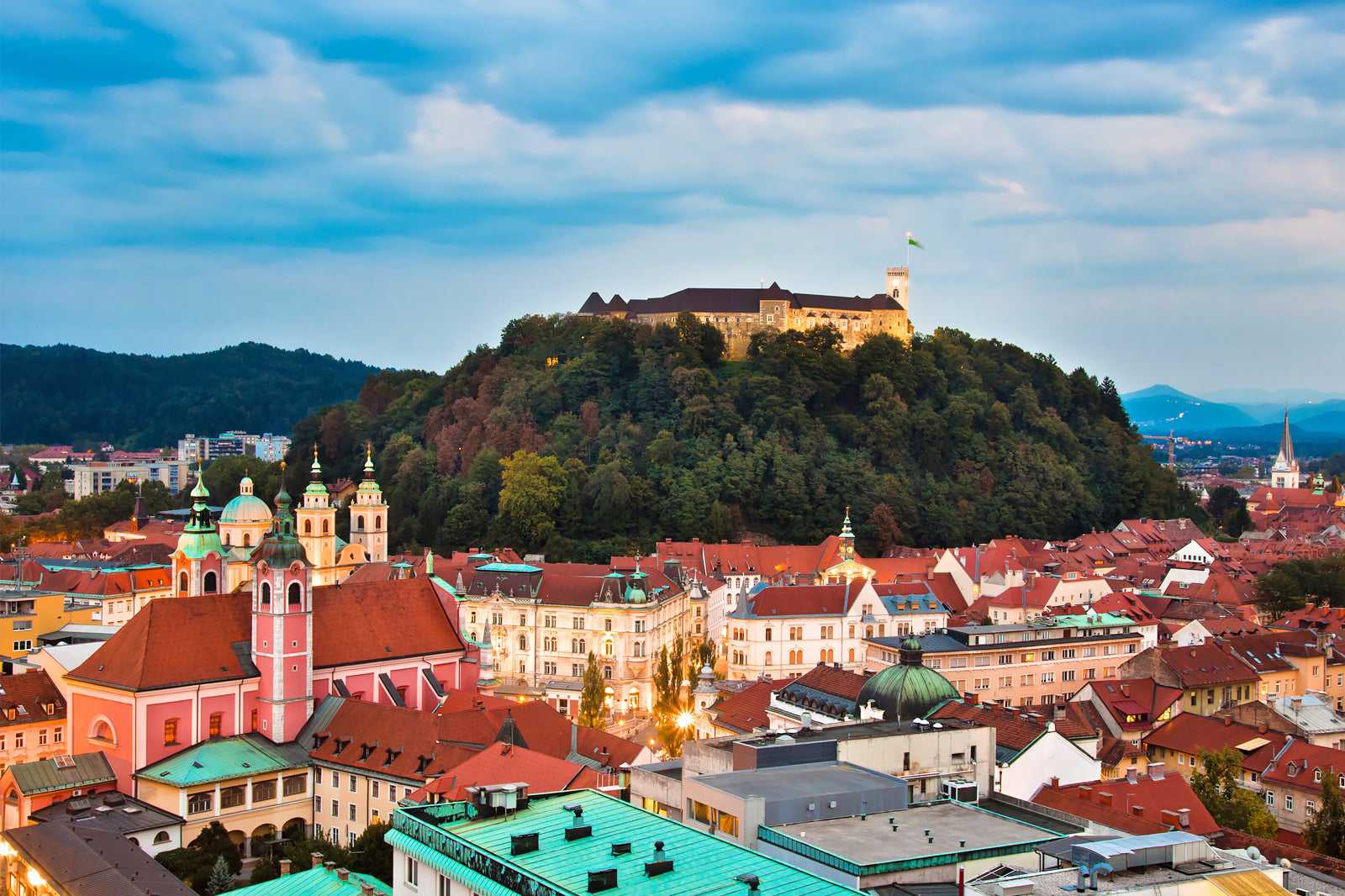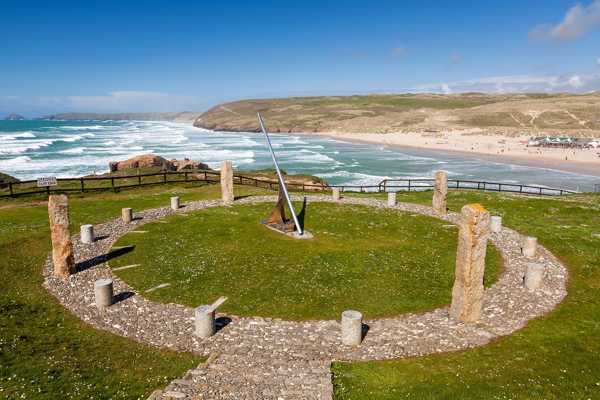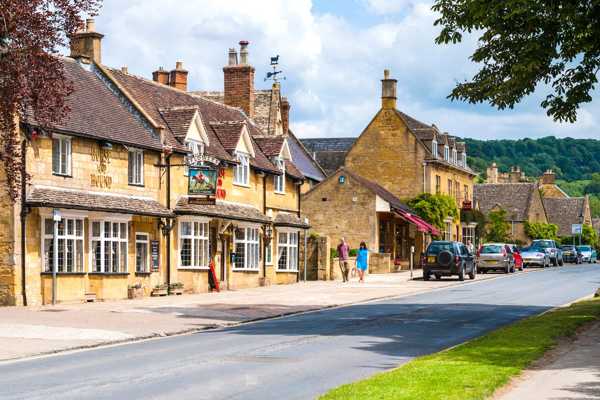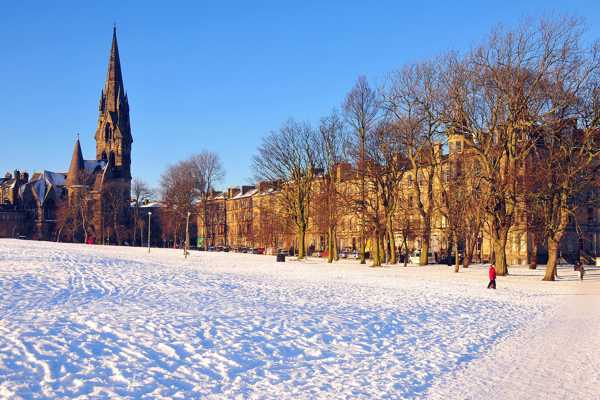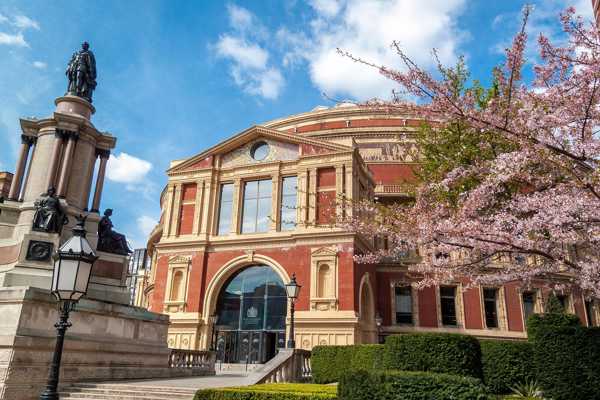The Slovenian capital of Ljubljana is undeniably charming with its flurries of bustling cafes, restaurants and bars, which solidify it as an upcoming ‘hipster’ European city. But part of this attraction owes to the city’s stunning scenery; copper-coloured houses nestled in with lush green spots and a blindingly blue river.
The city largely owes its attractive appearance to its most famous architect, Jože Plečnik, a classicist who tried to model the city on ancient Athens. Many of our choices below are the workings of his beautiful mind and make Ljubljana the gorgeous city it is today. We recommend the best way to explore these architectural sights is on foot, but if you're looking for something speedier, renting a bicycle is well within your means.
- 1
Vurnik House
Said to be the city’s most colourful building

- Budget
- History
- Photo
Vurnik House, or Vurnikova hiša, also known as the Cooperative Business Bank building, is one of the city’s most famous buildings and it’s not hard to see why. Located in the Art Nouveau quarter, this building dates back to 1921 and follows the design of architect, Ivan Vurnik.
The building’s gorgeous exterior was painted by Vurnik’s Viennese-born wife, Helena, who mixed geometric ornaments set in the colours of the Slovenian tri-colour with elements of Slovenian iconography. The result is one of the finest examples of Slovenian national style architecture. Although the house is not open to tourists, you should stop for a good look of the house’s captivating exterior, as you explore the area.
Location: Miklošičeva Cesta 8, 1000 Ljubljana, Slovenia
Map - 2
Cathedral of St. Nicholas
Admire its gloriously golden interiors

- Budget
- History
- Photo
The Cathedral of St. Nicholas, or simply Ljubljana Cathedral, has a fascinating interior and even more fascinating history. The first church to stand in its place was a Romanesque-style church built in the 13th century. This church burned down and was then replaced with a gothic-style church. It was destroyed in another fire and transformed into what we know it as today, in 1706, following the baroque-style designs of architect, Andrea Pozzo.
Although there are many impressive architectural features of the cathedral, ones to look out for are the dome fresco painted by Matevž Langus in 1844 and the bronze doors, by Tone Demšar, which depict the history of Slovenia.
Location: Dolničarjeva Ulica 1, 1000 Ljubljana, Slovenia
Phone: +386 1 234 26 90
Mapphoto by Jorge Láscar (CC BY 2.0) modified
- 3
Nebotičnik
One of the city’s architectural icons

- Budget
- History
- Photo
Upon its completion in 1931, Nebotičnik was the highest building in Yugoslavia and the 7th tallest in Europe. This marked it as a modern icon of Ljubljana, and the skyscraper still holds a firm place in the city’s architectural landscape today.
Towering 70 metres into the sky, Nebotičnik was designed to house shops, restaurants, and even apartments. Its modern amenities of the time, such as fast lifts, air-conditioning, and central heating made the building, designed by Vladimir Šubic, a symbol of Ljubljana’s progressiveness. Although the exterior may not be as visually stunning, the building’s rooftop cafe offers stunning views reaching all the way to the Alps on a clear day.
Location: Štefanova Ulica 1, 1000 Ljubljana, Slovenia
Open: Sunday–Wednesday from 9am to 1am, Thursday–Saturday from 9am to 3am
Phone: +386 4 023 30 78
Map - 4
The National and University Library
Uncover the unique style of Slovenian architect, Jože Plečnik

- Budget
- History
- Photo
The National and University Library is one of the most significant works of Jože Plečnik. As one of the most important educational institutions in the country, the building has made its mark on the city’s landscape. Plečnik’s touch can be seen in the mixtures of architectural styles – he added antique-style columns to the lobby but followed the classic rules of Renaissance architecture for its main design.
Outside the National and University Library, you’ll see a distinct smattering of greys and oranges, which is a combination of stone and recycled bricks from demolished houses in Ljubljana. Take your time wandering around and inside this giant library. You can also peruse over 2.6 million books during your visit.
Location: Turjaška Ulica 1, 1000 Ljubljana, Slovenia
Open: Monday–Friday from 8am to 8pm, Saturday from 8am to 2pm (closed on Sundays)
Phone: +386 1 200 11 88
Map - 5
Križanke
Ljubljana’s historic outdoor venue

- Budget
- History
- Photo
Križanke is an outdoor theatre used for summer festivals that once hosted a large monastery complex called the seat of the Order of Teutonic Knights. After World War II, it was re-purposed as an events space with 80-year-old Plečnik tasked with its redesign.
His design was inspired by the Renaissance architectural style. Before his death, Plečnik implemented an exhibition space and a chamber event venue. His students, Anton Bitenc and Viktor Molk, then built the summer theatre on the site of the former monastery garden and the restaurant in the main yard. The venue is particularly idyllic on summer nights, so check the website for events going on during your stay.
Location: Trg Francoske Revolucije 1, 1000 Ljubljana, Slovenia
Phone: +386 1 241 60 12
Map - 6
Cobblers’ Bridge
A historic spot with a lively ambience

- Budget
- History
- Photo
Cobblers’ Bridge, also known as the Shoemaker’s Bridge, is a pretty spot for a stroll on a clear day. This was the location of an old wooden bridge that connected the 2 medieval parts of Ljubljana: the Town Square and the New Square. In an attempt to catch passing trade and to avoid paying taxes, cobblers set up workshops atop the bridge. This birthed its new name, and the current bridge was built by none other than Jože Plečnik.
You can wander along Cobblers’ Bridge and watch the slow-churning boats below. On Sunday mornings, pop by for a visit to its flea market or visit in the evening when buskers play live music into the night.
Location: Šuštarski most, 1000 Ljubljana, Slovenia
Mapphoto by Dira0101 (CC BY-SA 4.0) modified
- 7
Ljubljana Central Market
Wander around these halls along the river

- Budget
- Food
- History
- Photo
The halls of Ljubljana Central Market at Vodnik Square are one of the most identifiable landmarks of the city. Built between 1940 and 1944, the halls are designed to follow the curve of the river Ljubljanica. With sweeping semi-circular windows overlooking the river’s glistening waters, you get a kind of Venetian feel as you explore the ins and outs of these halls.
The street-facing windows are decked with classical-columned colonnades, which cover stalls selling spices, herbs and arts and crafts. Spend plenty of time walking around the multiple halls, which span the entire breadth of the river embankment from the Dragon Bridge to the Triple Bridge. It’s advised to come with an empty stomach…
Location: Adamič-Lundrovo Nabrežje 6, 1000 Ljubljana, Slovenia
Open: Monday–Friday from 7am to 4pm, Saturday from 7am to 2pm (closed on Sundays)
Mapphoto by domdomegg (CC BY-SA 4.0) modified
- 8
Triple Bridge
Soak up the city’s atmosphere at this scenic spot

- Budget
- History
- Photo
The adored Triple Bridge was created in 1842 by Jože Plečnik, when he added 2 pedestrian footbridges to the base of the old Franz Bridge. As an obvious icon of Ljubljana, it is no wonder why you’ll find eager crowds stopping for pictures as you stroll around the area.
The popularity of the Triple Bridge also owes to the fact that it connects the city’s modern main square with the old medieval town and the market on the other side of the bank. On a blue-skied day, sit by the embankment with a coffee or ice cream in hand and take in the beautiful views of the flowing river, shuffling bodies and regal architecture.
Mapphoto by Med Cruise Guide (CC BY 2.0) modified
- 9
Ljubljana Town Hall
The city’s most beautiful example of baroque architecture

- History
- Photo
The Ljubljana Town Hall was erected in the late 15th century and then later rebuilt in 1718. The Gothic-style courtyard inside, which is arcaded on 3 levels, hosted theatrical performances in the past and now has been marked with modernity with some lovely graffiti sprawled across its walls.
While the townhall’s facade reflects Venetian architectural influences, the building and its clock tower are some of the city’s most striking Baroque monuments. One-hour guided tours are offered in English on Saturdays at 1pm. Tours must be booked in advance through the Ljubljana Tourist Information Centre.
Location: Stritarjeva Ulica 2, 1000 Ljubljana, Slovenia
Open: Monday–Friday from 8am to 5pm (closed on weekends)
Phone: 1685023
Map - 10
Ljubljana Castle
Understandably, the city’s main attraction

- Families
- History
- Photo
Ljubljana Castle is a must-see attraction for visitors interested in the city’s architecture and history. It is said the castle was first built in the 12th century as a wooden and stone structure, which was then added onto over the years to make it into what we know it as today.
Resting tentatively on top of a hill, the castle also provides sprawling views of the city and beyond, which can be seen from the castle’s Outlook Tower. The castle also houses a museum exhibition on Slovenian history, a puppet museum, several historical rooms such as the Chapel of St. George, the prison and a video room called ‘Virtual Castle’. Make sure to wear your most comfortable walking shoes.
Location: Grajska Planota 1, 1000 Ljubljana, Slovenia
Open: Daily from 9am to 8pm
Phone: +386 1 306 42 30
Map
